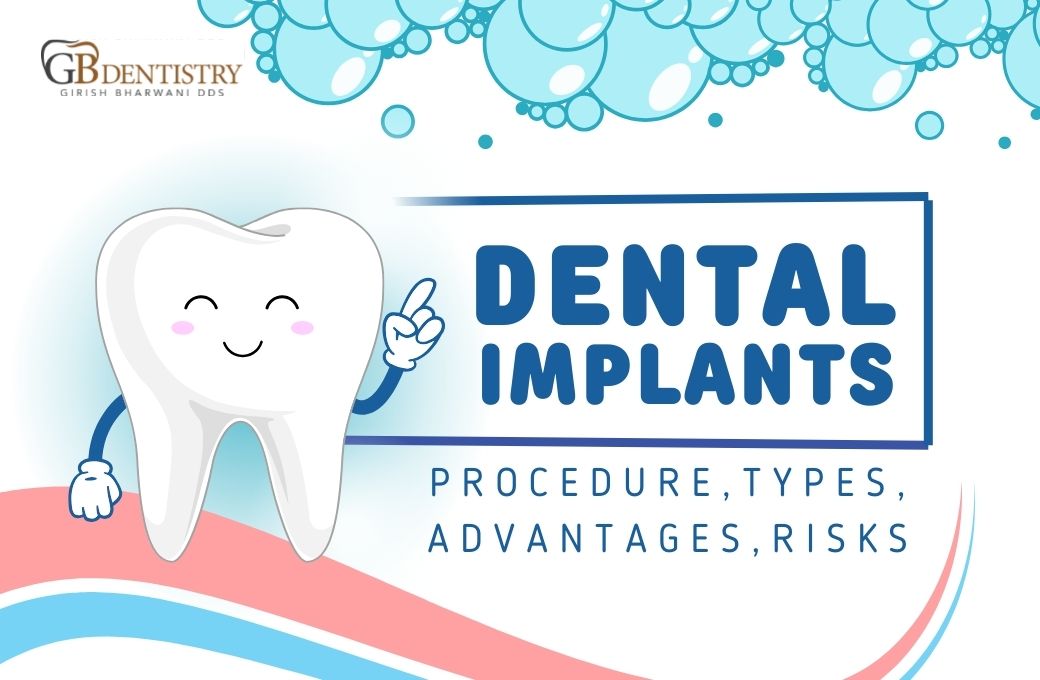Bruxism Mouth Guard: Key to TMJ Pain Relief & Better Sleep
Relieve TMJ pain and improve sleep with a custom bruxism mouth guard from GB Dentistry in Memorial, Houston. Comfortable, effective protection starts here.

Dental implants are like small anchors that are surgically placed into your jawbone to hold replacement teeth in place. They function similarly to the roots of natural teeth, providing a strong foundation for fixed or removable replacement teeth. These implants are made from biocompatible materials, ensuring they integrate seamlessly with your bone and gum tissues, offering a permanent solution that looks, feels, and functions just like your natural teeth.
Dental implants are generally made of two materials: titanium and zirconium oxide.
Titanium: is the most commonly used material due to its excellent biocompatibility. Titanium implants integrate seamlessly with the jawbone in a process called osseointegration, forming a strong and stable foundation for the artificial tooth. Titanium’s durability and resistance to corrosion make it a good choice for long-lasting implants.
Zirconium Oxide: often referred to as zirconia, is a metal-free implant option that offers a more aesthetic look, especially for patients with metal sensitivities. Zirconia implants are known for their strength and ability to blend naturally with the color of teeth and gums, making them an appealing choice for front tooth replacements.
Dental implants come in two main types: endosteal and subperiosteal implants. Each type has its own procedure and timeline for completion.
Endosteal Implants: These are the most common type of dental implants. They are surgically placed directly into the jawbone. The procedure typically involves several stages:
Subperiosteal Implants: These are less common and used for patients with insufficient bone height who cannot undergo bone augmentation procedures. They are placed under the gum but above the jawbone. The procedure involves:
Dental implants are an excellent solution for many individuals seeking to replace missing teeth. Ideal candidates include those who:
For example, individuals who have lost teeth due to injury, decay, or periodontal disease can significantly benefit from dental implants in Memorial, Houston, TX. These patients often find that implants not only restore their smile but also improve their ability to chew and speak, enhancing their overall quality of life.
While dental implants are a versatile solution, they are not suitable for everyone. Individuals who may not be ideal candidates include those who:
For instance, someone with severe osteoporosis might not be a good candidate for dental implants due to compromised bone strength, which can affect the stability and longevity of the implant. Similarly, patients who cannot maintain proper oral hygiene or follow post-operative care instructions may face complications with dental implants.
Dental implants offer numerous advantages, making them a preferred choice for tooth replacement:
While dental implants have a high success rate, they come with potential risks and complications:
Dental insurance coverage for implants can vary significantly based on the provider and specific plan. Generally, dental implants are considered a cosmetic procedure, and many standard dental insurance policies do not cover them. However, some insurance plans may cover part of the cost if the implant is deemed medically necessary. It’s important to check with your insurance provider for details on coverage, limitations, and any pre-authorization requirements.
For instance, some plans might cover the crown or abutment part of the implant but not the surgical procedure itself. Understanding your insurance policy can help in planning and managing the costs associated with dental implants.
At GB Dentistry, we understand that the decision to get dental implants is significant. As Dr. Bharwani always advises, “Dental implants are an investment in your long-term oral health and overall well-being. They not only restore your smile but also improve functionality and prevent further dental issues. If you’re considering dental implants, we encourage you to schedule a consultation to discuss your specific needs and determine the best treatment plan.”
Remember, maintaining good oral hygiene and regular dental check-ups are crucial for the success of your implants. Let us help you achieve a confident, healthy smile that lasts a lifetime. You can like our Facebook page and follow us on Instagram as well.
The main downsides include a longer healing time, potential for implant failure, and a higher upfront cost compared to other options. However, dental implants offer unmatched durability and aesthetics, and GB Dentistry ensures a smooth and effective process.
A single dental implant in Houston typically costs between $3,000 and $5,000. GB Dentistry provides personalized consultations to determine your needs and offers flexible financing to make your treatment affordable.
Conditions like insufficient bone density, uncontrolled diabetes, or heavy smoking may affect implant eligibility. GB Dentistry evaluates each case thoroughly and offers alternative solutions when necessary.
Both procedures involve some discomfort, but most patients find implant placement to be less painful due to anesthesia and post-procedure care. GB Dentistry ensures a comfortable experience for every patient.
Implant insertion is typically pain-free with the use of local anesthesia. Mild soreness after the procedure is common but easily managed with prescribed medications. GB Dentistry prioritizes patient comfort throughout the process.
The surgery usually takes 1 to 2 hours per implant. The overall timeline, including healing, can range from a few months to a year. GB Dentistry streamlines the process to deliver exceptional results efficiently.
Avoid smoking, hard foods, and vigorous rinsing for the first few days to promote healing. GB Dentistry provides detailed aftercare instructions to ensure the success of your dental implant.